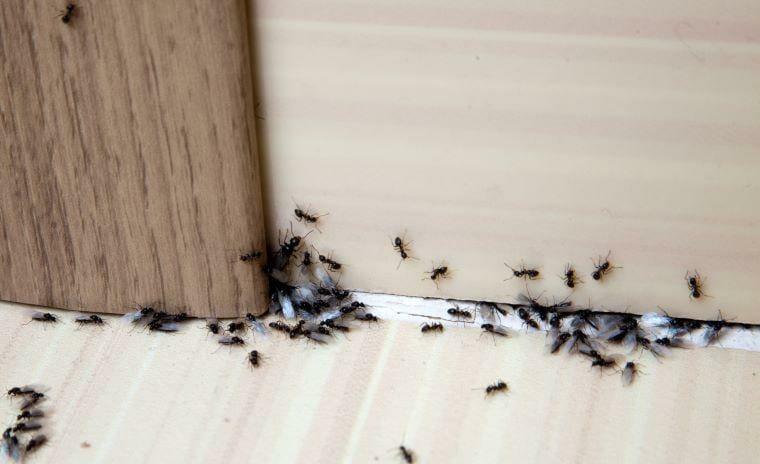
There are a variety of methods for removing ants and their nests from your property. Some natural remedies can solve the problem without introducing chemicals or pollutants into the environment. However, prevention is always preferable. Let’s find out a few effective methods to keep ants away from your home kitchen.
Table of Contents
Effective Methods to Keep Ants at Bay From Kitchen
Below are some of the most effective techniques to keep ants out of your kitchen.
1. Keep Food Safely Stored
When not in use, make sure all pantry products are securely packed and stored in an area that is not easily accessible to ants. For instance, sugar, honey, and cereal should always be stored in sealed glass jars, containers, or refrigerators. Pantry shelves and wire racks can also prevent ants from gaining access to your food and components.
2. Maintain a Clean Kitchen.
It may seem self-evident, but the presence of food left out for the taking is what draws ants to your kitchen and keeps them coming back. Sugar granules on the bench, bread crumbs, bits of fruit, a sticky region of syrup, or even grains of salt are all things that ants will look for to carry back to the colony.
When one ant discovers a food supply, it will use its chemical trails to alert the rest of the community, which will soon overwhelm your kitchen. The solution is easy to understand. Clean the counters, cupboards, pantry, kitchen sink, and kitchen floor from top to bottom. Cleaning all surfaces, as well as sweeping and mopping, should be done regularly. Cleaning all surfaces, as well as sweeping and mopping, should be done on a regular basis.
3. Lemon and Orange Should be Used in Everything.
You can also sprinkle the peels of these fruits in the ant’s usual path or use a mop to clean the kitchen floor with lemon or orange juice. This will leave a lemony odour and a bitter taste on the floor, which ants abhor.
4. Use Smells That are Naturally Repellent.
Like many other insects, ants use their odour to locate their next meal. Instead of reaching for harsh and potentially dangerous deadly sprays and traps, certain smells will suffice.
5. Ensure That There is no Standing Water.
While food is the primary reason for ants to explore, water also draws a colony’s interest. A little drop or pool of water can relieve an ant’s hunger for a long time, eventually turning it into an oasis for the entire colony. The colony will want to be closer to your kitchen if the water source is trustworthy. Clean up any water spills pretty much immediately, and also under as well as around sinks, freezers, and other high-moisture areas, to avoid attracting ants.
6. Entry Points Should Be Closed
Now is the time to get down to the nitty-gritty with the investigation. You need to figure out how the ants are getting into your house — small breaches in the walls, fractures in the floor, or gaps between windows and doors — and seal them as soon as possible. If you’re not sure where the crumbs will emerge, drop a couple, and when the ants come to get them, you can follow the ant road.
When closing windows and outside doors, ensure they are firmly sealed. Even the finest holes or gaps could provide a convenient access point for ants looking for food. Before ants have such a chance to get inside, fill in any cracks. This includes inspecting any screens for rips or tears, as even the tiniest breaches can allow ants to enter your home.
7. Bait Traps Should be Used.
Consider using bait traps if you know any colonies nearby or simply want the peace of mind that comes with proactive security. These repel ants from your home and can even help with existing infestations. Bait traps and liquid bait can be used to eliminate colonies right at their source. Ants will discover the bait trap, consume a small amount, and then transport the material back to the colony, poisoning the other ants, including the queen, resulting in the colony’s extinction.
8. Diatomaceous earth
Diatomaceous earth is a soft rock type made up of diatoms that have been fossilised. To prevent ants from entering your home, spread this around entryways and outside your home, directly on anthills. Take precautions before using this because it is a very strong material that can irritate the eyes, lungs, and skin. It is preferable to use more natural treatments if you have sensitive skin or allergies.
9. Strong Smells
Ants are repelled by strong fragrances like eucalyptus, vinegar, and peppermint. To get the best results, blend fragrant oils with a little water and spritz it over your house.
Conclusion
Ants can be destructive, especially when they enter your kitchen. If you already are suffering from ant infestation and looking to getting rid of the same, try the methods mentioned above. In case, you have tried everything but found no luck, hiring professional pest control services is your last bet.


